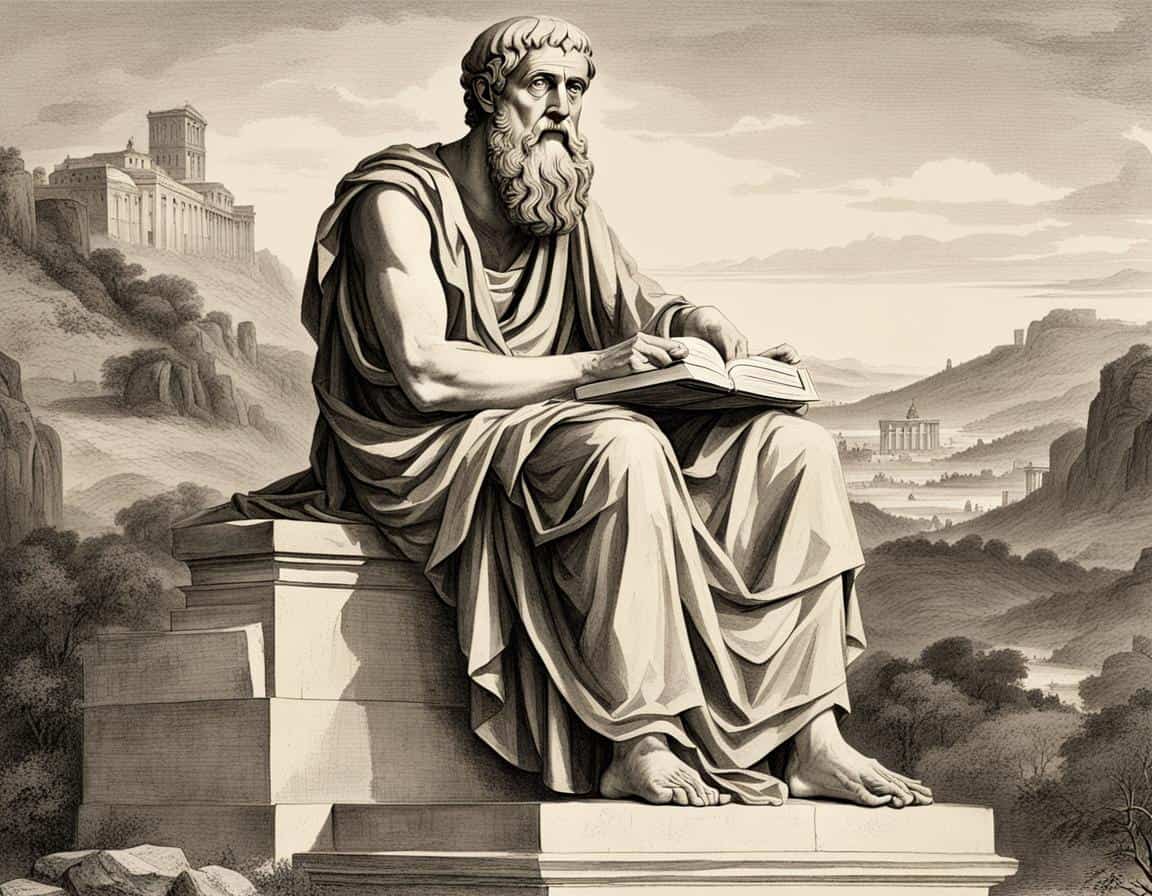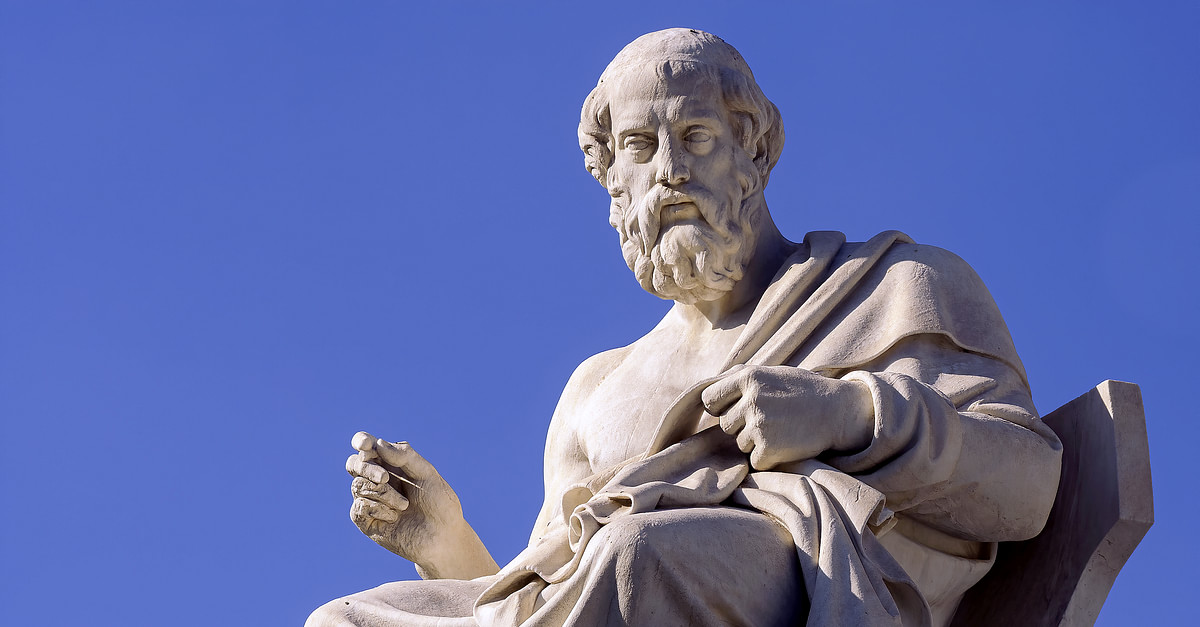Foundations of Western Philosophy

Plato, the eminent Greek philosopher from Athens, is renowned as one of the most influential figures in Western philosophy. His establishment of the Academy around 387 BCE is often cited as the beginning of formal education in the Western world, acting as a model for future educational institutions. This school attracted many scholars and became a center for philosophical discussion, nurturing ideas that would resonate throughout the ages. Plato’s approach to philosophy emphasized the importance of dialogue and critical inquiry, which not only shaped the intellectual landscape of his time but also laid the groundwork for subsequent philosophical thought[4][9][10][12].
Plato’s commitment to exploring fundamental questions about reality, knowledge, and ethics introduced key philosophical concepts that have continued to shape intellectual discourse. One of his most significant contributions is the Theory of Forms, positing that non-material abstract Forms represent the most accurate reality. According to Plato, the tangible world we perceive is merely a shadow or imitation of these ideal Forms, such as beauty and justice. This dualistic perspective fundamentally influenced metaphysical discussions in Western philosophy, prompting philosophers to explore the relationship between the physical and the abstract[5][8][10][12].
The Allegory of the Cave

Integral to Plato's philosophical framework is the Allegory of the Cave, presented in 'The Republic.' This allegory illustrates his belief in the transformative power of philosophical education. In the allegory, prisoners are chained inside a cave and can only see shadows cast on the wall, mistaking these shadows for reality. One prisoner escapes and discovers the true world outside—a metaphor for enlightenment and the journey from ignorance to knowledge. This powerful narrative serves as a critique of empirical perception and underscores the philosopher's role in society as a seeker of truth[6][10][12].
Ethical and Political Philosophy
Plato’s exploration of ethics is fundamentally linked to his metaphysical views. He argued that virtue is rooted in knowledge, asserting that understanding the Form of the Good leads to moral behavior. For Plato, a just life is one aligned with the pursuit of knowledge and the cultivation of virtue, which he depicted through the interplay of reason, spirit, and appetite within the tripartite soul[7][10].
His political philosophy, articulated in 'The Republic,' presents the concept of the philosopher-king—an ideal ruler infused with wisdom and virtue, tailored to lead society toward justice. Plato's critique of existing political systems, particularly democracy, reflects his concern that unqualified leaders can lead to chaos and social decay. According to Plato, only those with deep philosophical insight, grounded in knowledge of the Forms, are fit to govern[3][4][7][11][12]. This vision of governance, advocating for rational and ethical leadership, continued to inspire political theorists throughout history, shaping discussions about the nature of justice and the ideal state.
Influence on Subsequent Philosophers

Plato's philosophies have profoundly influenced countless thinkers, including his most famous student, Aristotle. While Aristotle developed his own systems of thought, much of his work responds to and critiques Platonic ideas, creating a dynamic discourse that has characterized Western philosophy for centuries. Beyond Aristotle, philosophers in subsequent epochs, such as the Neoplatonists in the Hellenistic period and figures like Augustine during the early Christian era, integrated and adapted Platonic themes within their own frameworks, further solidifying his legacy[5][9][11].
Moreover, the Renaissance marked a revival of interest in Platonic thought, bridging ancient philosophy with emerging modern ideas. Scholars like Marsilio Ficino played significant roles in translating and promoting Plato's works, reintroducing his concepts of ideal forms and virtues that profoundly shaped Renaissance humanism and artistic expressions[8][9]. This resurgence illustrated the relevance of Plato's ideas in addressing contemporary concerns, emphasizing human potential and the pursuit of knowledge.
The Legacy of the Academy
The continuity of Plato's influence is evident in the enduring structure of higher education, deeply rooted in the model established by the Academy. This institution fostered a method of learning that transcended mere memorization, advocating for critical thinking and intellectual exploration. The dialectical method employed by Plato in his dialogues remains fundamental to modern educational practices, promoting a collaborative approach to learning that engages students in the pursuit of truth[1][4][10].
Even in contemporary discussions, themes rooted in Plato's philosophy—such as the nature of justice, the ideal structure of society, and the quest for knowledge—remain critical. The philosophical questions he posed about the nature of reality, existence, and morality continue to resonate, encouraging ongoing inquiry across multiple disciplines[2][3][4][10][12].
Conclusion

Plato’s philosophical contributions have established him as a pivotal figure in the history of Western thought. His emphasis on the importance of reason, ethical governance, and the pursuit of truth continues to shape philosophical discussions today. Through his dialogues, allegories, and the establishment of the Academy, Plato not only influenced his contemporaries but also laid the foundational stones for the intellectual traditions that would follow. His legacy endures as a catalyst for philosophical inquiry and as a model for the pursuit of knowledge and understanding in an ever-changing world.
Get more accurate answers with Super Pandi, upload files, personalized discovery feed, save searches and contribute to the PandiPedia.
Let's look at alternatives:
- Modify the query.
- Start a new thread.
- Remove sources (if manually added).